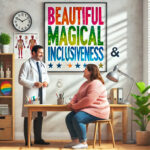When a food binge can be helpful
When a food binge can be helpful

“… bringing on, deliberately, what you fear most is an excellent way to increase self-belief”
by June Alexander
“I’ve been on a binge.” What does a binge mean to you? Is it something you carefully plan and prepare for, or does your bingeing “just happen?” Do you make a list of food that you plan to consume, go shopping, lay the food out on nice plates on your dining table, and proceed to consume the food in an orderly manner, or do you furtively raid the refrigerator and kitchen cupboards, hide shamefully in the pantry or bedroom, or hop in your car to collect an order at a fast food outlet, and stuff yourself as quickly as possible?
Either way, how do you feel afterwards? Did you have a few minutes of bliss where you felt at peace? Because your binge was effectively suppressing unwanted thoughts and temporarily numbing emotional pain? But then did you start to feel “yuck,” and felt filled with self-loathing and disgust? Or did you think “I really don’t want to hurt myself in this way anymore?”
Binge eating is a pattern of disordered eating which consists of episodes of uncontrollable eating. During such binges, a person rapidly consumes an excessive quantity of food. A diagnosis of binge eating is associated with feelings of loss of control.
If you are feeling concerned that you are developing symptoms of binge eating, and nothing you try seems to be helping, I encourage you to see your doctor as soon as possible for a referral to an eating disorder specialist. Hopefully you are not developing an eating disorder, but if you are early intervention will give you the best chance for quickly getting your life back on track. It is better to access health services immediately, than wish you had done so, six months from now.
To help you understand what bingeing is about, and what you can do about it, I provide this excerpt from Getting Better Bite by Bite. This book is evidence-based, so you can count on its information. So, read on:
Many different patterns of bingeing
These examples show that there are many different patterns of bingeing. You may need to monitor yourself using your diary for one to two weeks to get to know your own pattern. Once you know your pattern a bit better, try to “play around” with it a little to increase your sense of control. Try to limit your binges to just one place. Alternatively, try to restrict your bingeing to just part of the day.
- Write down a list of situations that trigger your binges and use the problem-solving approach to find ways of dealing with each one.
- Try to anticipate danger-zones. Weekends with a lot of unstructured time are prime bingeing time for many, as are journeys to and from work and lonely evenings. Draw up a timetable of pleasurable things to do during these times, such as creating and drawing from a comfort box filled with reminders of things you enjoy, and stick to it.
- When you feel like bingeing, distract yourself by doing something that is incompatible with bingeing, like going for a walk, phoning or seeing a friend. Watching television and reading are not very helpful in this respect, as you can binge at the same time. Many TV adverts are designed to promote dissatisfaction with ourselves as we are encouraged to consume more.
- Don’t do your food shopping when you are feeling hungry.
- Don’t ask your parents/partner/flat-mate to lock the kitchen door. This is bound to make you want the food inside more, and you will almost certainly find a way in.
- Don’t blame yourself if you have had a binge. Look carefully at your behavior chain, and spot the opportunities for new if . . . then strategies. Work through in your mind what would have happened if you had chosen a different behavior – like making a phone call, or going for a walk, instead of opening the refrigerator. You will have learnt something for next time (see Chapter 8 in Getting Better Bite by Bite, which discusses slips).
Check your progress with a planned binge
Many people feel frightened if they haven’t binged for a while. They are fearful any binge will send them back to “square one”. To reassure yourself that this is not so, a useful strategy is to plan a binge, and return straightaway to your regular three meals and three small snacks a day eating pattern. A small setback can’t undo the good work you have done for weeks.
Try to avoid people, places and things that are associated with bingeing for you.
Preventing slips – Plan your own relapse
Recovery from an eating disorder involves facing numerous setbacks before the eating problem subsides. Everyone on the recovery journey confronts obstacles at some time or another. Knowing this can help you not to panic about the prospect of having a slip.
Many people find, when they haven’t binged and vomited for a while, that they get increasingly anxious and worried that a setback might strike at any moment and hit them harder than ever.
One practical way of dealing with this anxiety is to plan a relapse. No, I am not having you on: bringing on, deliberately, what you fear most is an excellent way to increase self-belief.
Set aside some time, buy your favorite binge foods, and have a binge. Spread all the food out on the table, and eat as much as you can. Focus on your binge as fully as you can. Can you bring yourself to stuff the food down in your usual fashion? Can you bring yourself to eat as much of each food as in the past? How does it feel? Is this really the worst thing that can happen to you? At the end of this binge, do you feel you are back to square one?
Repeat this exercise at least once a month if you feel worried that you are doing too well.
What to do if a slip occurs
After a slip, it is easy to think the worst, be your harshest critic and loathe yourself. You perhaps think that having slipped once, this confirms you are a total failure and will never recover. You may tell yourself that the recovery journey is too hard, and that the discomfort of trying and failing and trying again is too much to bear. We suggest that, instead of thinking this way, you try to be compassionate to yourself.
Self-compassion is a way of positively relating to oneself that does not involve judging yourself or comparing yourself against other people. It has three components:
- Self-kindness, i.e. thinking about yourself and your actions with warmth and understanding.
- Being aware that mistakes, suffering and unfairness are part of the human condition.
- Neither ignoring nor ruminating on disliked aspects of oneself or one’s actions/life.
So what does that mean in practice if you have slipped? Don’t hate or despise yourself. Remind yourself of your good intentions. You have been trying hard to make changes and recover. Think of what you can learn from the slip. Keep things in perspective. This is just a slip and you can do something about it. And if you cannot manage yourself because the eating disorder voice has become too loud, reach out. See a doctor. Today. Because you deserve to be happy and free.
Acknowledgment:
Main image, by illustrator Elise Paquette, is from P.59, in Getting Better Bite by Bite.

Further Reading
English:
Getting Better Bite by Bite: A Survival Kit for Sufferers of Bulimia Nervosa and Binge Eating Disorders, U Schmidt, J Treasure, J Alexander (2015) Routledge.
German:
Die Bulimie besiegen: Ein Selbsthilfe-Programm
https://www.amazon.co.uk/Die-Bulimie-besiegen-Ein-Selbsthilfe-Programm/dp/3407864094
Korean:
The link to purchase this version of Getting Better Bite by Bite is available here.





